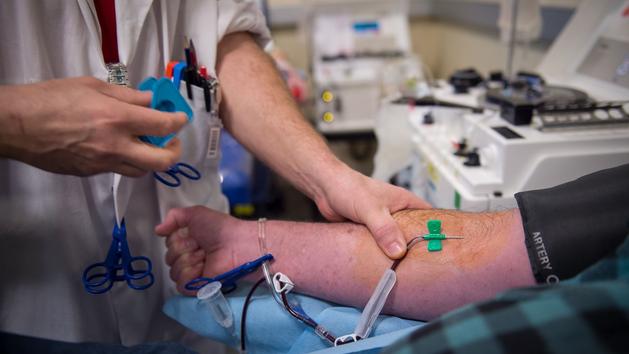Nicolas Giraud is president of the French Association of Hemophiliacs (AFH). Thomas Sannié, Norbert Ferré, Jean-Louis Dubourdieu and Edmond-Luc Henry are honorary presidents.
The debate in committee on the bioethics law, last June 1, before its examination in plenary session, made it possible to measure the lack of basic knowledge of the national representation on the questions of transfusion safety. Tabled by Hervé Saulignac, Socialist deputy of the Ardèche and followed by around fifty parliamentarians, his amendment was intended to introduce into the law that the criteria for selecting donors could not be "based on the sex of the partner (s) with which he allegedly had sexual relations ”, basing his claim on alleged discrimination against men who have sex with men (MSM).
All this is obviously false. There is no discrimination in blood donation. There is an epidemiological reality.All this is obviously false. There is no discrimination in blood donation. There is an epidemiological reality: studies have clearly shown a difference in risks, linked to the type of partner. In 2017 in France, MSM were still up to 200 times more exposed to HIV than heterosexuals and still represented 41% of new diagnoses (2,600 MSM) while they represent less than 4% of the French population.
From there, we must return to the principle of blood donation. Donating blood is not a right. The only right that exists is that of recipients of blood donations to have at their disposal medicines and blood products of the best possible health quality. Donating blood is not a donation by the donor's sole will. It only becomes so when all the health measures have been put in place to protect the beneficiaries against possible virological risks.
From there, it is necessary to "select" the donors, not arbitrarily, but based on objective criteria, and this is what these members do not understand, because they have no scientific culture, no memory of the contaminated blood drama and know nothing about blood transfusion.
The only right that exists is that of recipients of blood donations to have at their disposal medicines and blood products of the best possible health quality.So, if we can understand that the postponement of blood donation can be experienced as a stigmatization, the criteria for exclusion from blood donation do not constitute grounds of discrimination since they are based on solid scientific data and are proportionate with regard to the objective of transfusion safety pursued. Thus, multi-partner heterosexuals are subject to the same exclusion criteria. People transplanted, transfused, returning from countries with a strong viral epidemic are also excluded from donating blood.
However, this is indeed the case here: there is a risk for the beneficiaries of these treatments because of a prevalence / incidence 200 times higher among MSM of HIV.
Why should the transfusion safety of people who receive blood donations come to the fore? Why should their lives go behind so-called equal rights? In case of doubt, the precautionary principle must apply, because the most vulnerable, the sick, must first be protected.
These deputies deny 40 years of health security, because they favor a societal demand faced with a health reality. They forgot that 40 years ago, the generalization of blood collections in prisons for the sole purpose of rehabilitating prisoners despite the considerable risk of contamination of recipients caused a health disaster and hundreds of victims. Hemophiliacs remember this. These MEPs believe that the recognition of rights requires the erasure of differences. However, the principle of health security and especially in transfusion matters requires taking into account other elements and in particular the proven epidemiological risks for the beneficiaries of treatment. In 1983, at the time of the AIDS crisis, homosexual donors were excluded from blood donation because the prevalence of this disease was unfortunately very high in this community. Fortunately today, the situation is no longer as catastrophic, but it remains very worrying.
If the National Assembly were to definitively validate this article, it is a basis for epidemiological vigilance which would be annihilated and abandoned to demagoguery.For eight years, the French Association of Hemophiliacs has supported, without any dogmatism, the relaxation of the rules of access to blood donation for MSM. Thus, the regulations made it possible to go from a total ban to a ban of one year and then four months and the donation of plasma was opened. A study is underway to find out whether it is possible, with regard to health security rules, to align the access of MSM to ordinary law. MEPs did not even wait for the first half of 2021 to have the results of this study.
If the National Assembly were to definitively validate this article when examining the bioethics bill, it is a basis for epidemiological vigilance that would be annihilated and abandoned to demagoguery. The millions of people who donate blood every year would not understand why they are being put at risk. And the national representation would also be hard pressed to explain to them why. This is why the Minister of Health, the Prime Minister and the President of the Republic must put all their weight into the battle to open the eyes to a blind and memoryless national representation.

